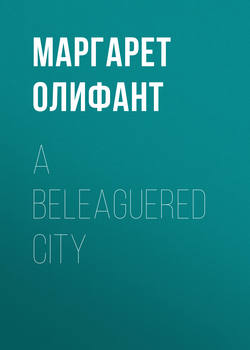Читать книгу A Beleaguered City - Маргарет Олифант - Страница 3
EXPULSION OF THE INHABITANTS
ОглавлениеI will not attempt to give any detailed account of the state of the town during this evening. For myself I was utterly worn out, and went to rest as soon as M. de Clairon left me, having satisfied, as well as I could, the questions of the women. Even in the intensest excitement weary nature will claim her dues. I slept. I can even remember the grateful sense of being able to put all anxieties and perplexities aside for the moment, as I went to sleep. I felt the drowsiness gain upon me, and I was glad. To forget was of itself a happiness. I woke up, however, intensely awake, and in perfect possession of all my faculties, while it was yet dark; and at once got up and began to dress. The moment of hesitation which generally follows waking—the little interval of thought in which one turns over perhaps that which is past, perhaps that which is to come—found no place within me. I got up without a moment's pause, like one who has been called to go on a journey; nor did it surprise me at all to see my wife moving about, taking a cloak from her wardrobe, and putting up linen in a bag. She was already fully dressed; but she asked no questions of me any more than I did of her. We were in haste, though we said nothing. When I had dressed, I looked round me to see if I had forgotten anything, as one does when one leaves a place. I saw my watch suspended to its usual hook, and my pocketbook, which I had taken from my pocket on the previous night. I took up also the light overcoat which I had worn when I made my rounds through the city on the first night of the darkness. ‘Now,’ I said, ‘Agnès, I am ready.’ I did not speak to her of where we were going, nor she to me. Little Jean and my mother met us at the door. Nor did she say anything, contrary to her custom; and the child was quite quiet. We went downstairs together without saying a word. The servants, who were all astir, followed us. I cannot give any description of the feelings that were in my mind. I had not any feelings. I was only hurried out, hastened by something which I could not define—a sense that I must go; and perhaps I was too much astonished to do anything but yield. It seemed, however, to be no force or fear that was moving me, but a desire of my own; though I could not tell how it was, or why I should be so anxious to get away. All the servants, trooping after me, had the same look in their faces; they were anxious to be gone—it seemed their business to go—there was no question, no consultation. And when we came out into the street, we encountered a stream of processions similar to our own. The children went quite steadily by the side of their parents. Little Jean, for example, on an ordinary occasion would have broken away—would have run to his comrades of the Bois-Sombre family, and they to him. But no; the little ones, like ourselves, walked along quite gravely. They asked no questions, neither did we ask any questions of each other, as, ‘Where are you going?’ or, ‘What is the meaning of a so-early promenade?’ Nothing of the kind; my mother took my arm, and my wife, leading little Jean by the hand, came to the other side. The servants followed. The street was quite full of people; but there was no noise except the sound of their footsteps. All of us turned the same way—turned towards the gates—and though I was not conscious of any feeling except the wish to go on, there were one or two things which took a place in my memory. The first was, that my wife suddenly turned round as we were coming out of the porte-cochère
